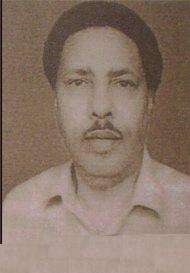Abdirahman Ahmed Ali Tuur
Abdirahman Ahmed Ali Tuur (Somali: Cabdiraxmaan Axmed Cali Tuur, Arabic: عبد الرحمن أحمد علي الطور) (var. "Tur", "Tour", meaning "Hunchback"[3]) (1931-2003) was a Somali politician. He was the first President of Somaliland,
Abdulrahman Ahmed Ali Tuur عبد الرحمن أحمد علي الطور | |
|---|---|
 | |
| 1st President of Somaliland | |
| In office 28 May 1991 – 16 May 1993 | |
| Vice President | Hassan Isse Jama |
| Preceded by | Position established |
| Succeeded by | Muhammad Haji Ibrahim Egal |
| 2nd Vice President of Somaliland[1] | |
| In office May 1993 – May 1995 | |
| Preceded by | Hassan Isse Jama |
| Succeeded by | Abdirahman Aw Ali Farrah |
| Personal details | |
| Born | April 4, 1931 Burao, British Somaliland |
| Died | 8 November 2003 [2] London, United Kingdom[2] |
Biography
Tuur was born in 1931 in Burao, then a part of the British Somaliland protectorate. He hailed from the Habr Yunis-Garhajis sub clan of the Isaaq [4]
He was one of the top student that graduated from the first Intermediate School in British Somaliland Protectorate and was given a scholarship to Sudan in 1948 to study in the famous Hantoob secondary School. In Hantoob he met and befriended with some of the future Sudanese leaders like Ja’afar Al-Numeiri, Sadeq Al-Mahadi and Hassan Al-Turaabi. Abdirahman excelled both in sports (especially football and track) and in academic studies. He got another scholarship and did his university education at Exeter University UK.
After successfully completing his university in the UK Abdirahman returned and started his career as an Administrative Officer in Borama in 1956 and was elevated to the position of District Commissioner (DC) 3 years later (1959). In 1961 he became Governor of the Eastern Region (Burao) and then in 1964 the Governor of Western Region (Hargeisa). In that same year he joined the Ministry of Foreign Affairs where he was appointed in the following diplomatic posts:
Sudan 1964-1968 and 1970-1971 Ambassador
Ethiopia 1972-1977 Ambassador
East Germany 1978-1981 Ambassador
UAE 1981 Ambassador
He later became the Chairman of the Somali National Movement (SNM), a guerilla force mainly drawn from his Isaaq clan, which was attempting to topple former President of Somalia Siad Barre's military regime. Although the SNM at its inception had a unionist constitution, it eventually began to pursue a separatist agenda, looking to secede from the rest of Somalia. Under Tuur's leadership, the local administration declared the northwestern Somali territories independent on 18 May 1991. He then became the newly established Somaliland polity’s first President, but subsequently renounced the separatist platform in 1994. Tuur concurrently began instead to publicly seek and advocate reconciliation with the rest of Somalia under a power-sharing federal system of governance.[5] In doing so, he also represented the interests of many other Isaaq members, who were against secession. [4] Tuur additionally lent some support to the UNOSOM peace-building mission in the southern regions. [6]
References
- Paquin, Jonathan (July 2010). A Stability-Seeking Power: U.S. Foreign Policy and Secessionist Conflicts. ISBN 9780773591028.
- "Archived copy". Archived from the original on 2018-06-23. Retrieved 2018-06-23.CS1 maint: archived copy as title (link)
- Issue Paper: SOMALIA, UPDATE ON THE SITUATION IN THE NORTH (SOMALILAND), Research Directorate of the Immigration and Refugee Board of Canada, January 1995
- Diedrich Westermann, Edwin William Smith, Cyril Daryll Forde (2009). Africa, Volume 79, Issues 1-4. Oxford University Press. p. 259.
- "Somaliland's Quest for International Recognition and the HBM-SSC Factor". Archived from the original on May 28, 2012.
- Somaliland and Peace in the Horn of Africa: A Situation Report and Analysis Archived 2008-05-17 at the Wayback Machine, M. Bryden, UN Emergencies Unit for Ethiopia Drafted 13 November 1995. Updated/edited version Published in African Security Review Vol 13 No 2, 2004 Archived June 26, 2010, at the Wayback Machine
Sources
- Somalia - Worldstatesmen.com
- "Somaliland: The Other Somalia with No War", Suliman Baldo in The Nation (Nairobi), 30 June 2006, The Nation (Nairobi)
- THE SECRETARY-GENERAL'S REPORT, ABDIRAHMAN "TUUR", AND SOMALILAND, SOMALIA News Update, Vol 3, No 16, May 28, 1994. ISSN 1103-1999